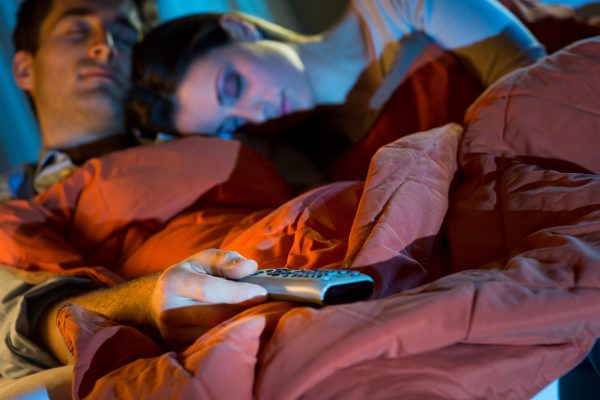Sleeping, artificial light and weight gain linked in women!

Sleeping, artificial light and weight gain linked in women - who would have predicted that sleeping with artificial light from a lamp or TV would put women at risk for weight gain - and even obesity? Holy cow! But, it’s true.
A new study shows that women who have a habit of sleeping with artificial lights on are at higher risk for weight gain.
Researchers reported in the Journal of the American Medical Association that women sleeping with artificial light are at greater risk for weight gain, obesity, higher body mass index and a larger waist circumference than those who don’t. Having the lights or television on in the bedroom during sleeping hours is correlated with these frustrating and common struggles that almost every woman knows too well.

You may wonder if it is really about the lights or something else like age, race, physical activity, diet, amount of sleep etc. Researchers controlled for these factors and found that, no, the issue is really just about the presence or absence of artificial lights.
Compared with the weight of women sleeping without artificial light, women sleeping with lights on were:
- 11 lbs heavier,
- 22% more likely to be overweight,
- had a 33% increased risk for obesity.
It’s unclear why sleeping with artificial light is associated with the risk of weight gain. Most women already struggle enough with this issue! The researchers hypothesize that light may disturb your normal sleep phases enough to alter hormones that regulate your appetite – whoa we don’t need that! It may also lower sleep quality enough to make us drowsy during the day, and that may have us reaching for sugar and carbs to keep going.
We can add this new info to what we already know about the benefits of a good night’s sleep to your facial appearance. A 2010 scientific study by the Department of Psychology at Stockholm University demonstrated the unfortunate consequences of a bad night's sleep on your facial appearance.
What happens to your face if you don't get enough sleep?
Sleep quickly impacts your facial appearance. The day following a poor night's sleep, expect to see more,
- hanging eyelids,
- red eyes (more than any usual redness),
- swollen eyes (more than any typical swelling),
- dark circles under the eyes,
- paler skin,
- increased wrinkles/fine lines,
- additional droopy corners of the mouth.
In this study, a good night’s sleep was defined as 8 hours. Sleep deprivation was 5 hours.
I wrote about this study in the past including my tips for how to counter the visible impact of sleep deprivation on your face. As study investigators said,
Because these facial regions are important in the communication between humans, facial cues of sleep deprivation and fatigue may carry social consequences for the sleep deprived individual in everyday life.
Some day’s that’s just not going to work and you need to know how to perk up your facial “communication” after too little sleep. If you know you are heading into some sleep deprivation, click here to see my quick remedies to counter some of the facial consequences.
What is really striking to me is that now we know it’s not just our transient appearance and physiology that are impacted by sleep. Longer term consequences such as weight gain are impacted too.
Combining the information from these two studies is a wakeup call (pun intended) that we need 8 hours of dark room sleep to look and feel our best.
I've known that light adversely impacts my sleep quality and I sleep with an eye mask to help block out light. I bought a really nice one on vacation and use it every night. I found it in Australia at Love Stories, a store that sells the coolest PJs and intimates. I bought my favorite pair of PJs there too.
At 60 I’ve been through the gambit of sleep misadventures - between menopause, career stresses and just getting old - and I value a good night's sleep. It's a priority for me, so my nightly routine is intentional. This routine is actually called 'sleep hygiene'. I’ll share it with you:

60+ year old dermatologist Dr. Cynthia Bailey’s bedtime skin care and nightly sleep hygiene routine:
- I start heading for bed no later than 10pm to prevent me from getting ‘a second wind’ as we call it in the insomniac ‘night owl’ household that I grew up in.
- I draw a warm bath and throw in 1 cup of Epsom salts.
- I soak in the bath, wash off my makeup and the day’s skin care products with my Extremely Gentle Foaming Facial Cleanser and my Clarisonic Brush.
- I sip ¼ cup of my home brewed goat milk kefir for probiotic replenishment as my tummy rests for the night.
- After my bath I apply my Natural Face and Body Lotion to my arms, hands and legs.
- I apply Glycolic Acid Body Lotion 15% to my feet and cover them with sox to keep my feet soft.
My nightly face skin care routine is much more complicated - and it's worth it!
- I use my Naturally Hydrating Pore Minimizing Toner on a cotton pad then I layer:
- Instantly Luminous Multi-Action Serum
- Retinol Intensive Anti-Wrinkle Night Cream followed either by
- Glycolic Acid 15% Anti-Wrinkle Face Cream (if my skin is not too sensitive) or
- Daily Face Cream enriched by boosting with a few drops of my Omega Enriched Face Oil.
Once in bed:
- I read something inspirational, right now Mary Oliver’s poems for about 10 minutes.
- Then I put on my eye mask, put in ear plugs (dear husband of 40 years snores) and my dental guard (gotta love the glamour of age).
I typically wake up around 7am. It’s a good 8 hours, adding time for the nocturnal sojourns to the loo (60 year old adventures). I feel refreshed and ready for the day.
Thankfully, I’m sleeping well after years of insomnia. My face looks less tired and droopy. Now that we know about weight struggles and sleep issues I’m doubly grateful.
References:
Park YM, White AJ, Jackson CL, Weinberg CR, Sandler DP. Association of Exposure to Artificial Light at Night While Sleeping With Risk of Obesity in Women. JAMA Intern Med. Published online June 10, 2019. doi:10.1001/jamainternmed.2019.0571
Sundelin T; Lekander M; Kecklund G; Van Someren EJW; Olsson A; Axelsson J. Cues of fatigue: effects of sleep deprivation on facial appearance. SLEEP 2013;36(9):1355-1360.
Axelsson J, Sundelin T, Ingre M, Van Someren EJ, Olsson A, Lekander M., Beauty sleep: experimental study on the perceived health and attractiveness of sleep deprived people. BMJ. 2010 Dec 14;341:c6614.









